How in the world could I narrow down the options to create a list of the best co-op board games?
I have no idea. Hundreds – if not thousands – of titles are out there, and many are brilliant.
On this page, I’ve put together a heavily biased list of the best co-op games I’ve come across. Some will agree; most won’t.
Let’s get into it.
My Top Picks at a Glance
Here are my top picks for the best co-op board games, depending on the individual’s circumstances.
Best Co-op Board Game – Overall
In my opinion, the very best overall co-op board game is Robinson Crusoe. It ticks all the boxes in my selection criteria and will leave you talking about what happened for hours.
Best Co-op Board Game for Beginners
If you’re getting started with co-op board games, I recommend Pandemic. Each game has many variations, but the mechanics are simple enough. Exit games and the Forbidden franchise are also great options.
Best Co-op Board Game for Theme
I have a few thoughts here, but the one that stands out to me is Spirit Island. It’s just such a unique concept, and it’s executed really well.
I have a few other worthy mentions, too. This one may come as a surprise to some. Still, I’m going to go with Burgle Bros. Many cooperative board games are all about mystery-solving or survival. Burgle Bros is something else a bit different, and this makes it special, theme-wise.
Forbidden Desert (the best in the series!), Robinson Crusoe, and Sherlock Holmes: Consulting Detective are also brilliant at immersing you in the setting.
Most Interesting Co-op Board Game With A Twist
I hadn’t even heard of Betrayal at the House on the Hill until recently, but yes. That one. The twist comes from the fact that one player may or may not become a traitor and turn on the group, making it a ‘usually, mostly co-op board game’.
Easiest Co-op Board Game to Pick Up and Play
I’d have to go for The Mind. It’s a tiny box, and all you need are the cards that come in it. It takes 30 seconds to set up and 30 seconds to put away, with a whole game often being over in under 10 minutes (because you lose).
Selection Criteria
There are actually loads of cooperative board games out there. In all honesty, I just recently heard of the concept when a group of us sat down to attempt Forbidden Desert. (It didn’t go that well.)
Now, I feel like a whole new world has been opened to me, one I’d never even imagined. And that’s a nice segue into my selection criteria for a great co-op board game.
Here’s what I want from a good one.
- A manageable challenge – if it’s too easy, it’s boring. If it’s too demanding, we tear our hair out. There’s a sweet spot somewhere in there. I haven’t kept track of any of our games, but I’d estimate a win percentage of between 15% and 50% is approximately what I’m after.
- Controllable factors – if it’s all just chance, it’s hardly a game. The more our decisions impact the subsequent events, the better.
- Engaging content – the sign of a great co-op board game is when you lift your head up and realize the entire table is standing up, leaning over to see what’s happening. Once it finishes, everyone chats about what they did and what happened because it was so riveting. Every option on my list should create that engaging atmosphere on your next game night.
- A great theme – this goes a long way to making a board game engaging, as above. An exciting theme can even make an otherwise dull co-op board game attention-grabbing.
- Variety – every time you play, it should be different from before. Otherwise, where’s the challenge, and what’s the point?
All The Best Co-Op Board Games Options
In no particular order, here are my picks for the best co-op board games.
I would usually write a couple of short paragraphs about how to play. Of course, in this list, that’s impossible. Each game has intricate and wildly varying scenarios, setups, themes, etc.
If my brief summary piques your interest, it’s worth reading up on the game in question in more detail!
Robinson Crusoe (2nd Edition)
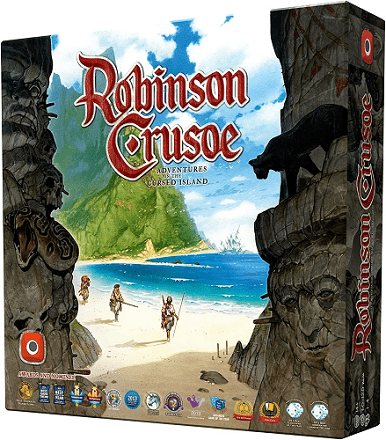
1 to 4 players
If you want an engaging story that’s always different from the previous round, look no further. Robinson Crusoe has the answers!
Honestly, this is one of the best co-op board games – maybe even the best. Its complicated setup process takes some getting used to, but once you’re used to the six-phase rounds, it’s fantastic. I’d say it’s the definition of a fully immersive experience!
Although there’s quite a lot going on, the possibilities are endless. After being marooned on a desert island (as always in these games!), you have to eat, sleep, find shelter, keep morale up, and explore. With lots of different scenarios, there’s always a new and exciting way to play.
I don’t have much bad to say about it at all! This game might not be for you only if you aren’t into moderately complex tabletops.
Betrayal at House on the Hill (3rd Edition)
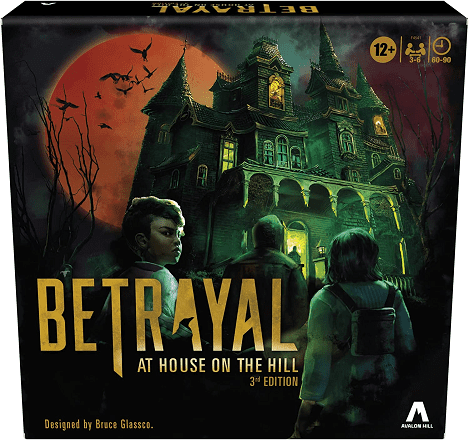
3 to 6 players
We came across this game at our most recent games night.
As are many of these mystery-style games, it’s based in a haunted house. We really like the exploration- and tile-based gameplay, though. The various haunts, tokens, and traits mean each game is entirely different from the last.
With so many individual parts to the game, it looks daunting at first. But you get used to it after a couple of playthroughs.
The final thing worth mentioning that really raises the bar is the traitor (or lack thereof). Once the haunt starts, a traitor might be identified (not always, though!). Most of the time, you’ll know who they are; occasionally, you won’t. This feature mixes things up and adds another level to a co-op board game!
Pandemic
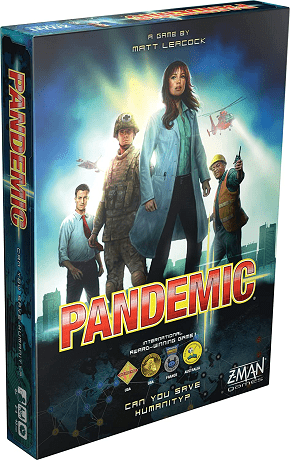
2 to 4 players
Pandemic is somewhat of a classic, but let’s point out the obvious immediately. The game might feel too close to home for some people, especially those badly affected by Covid and the resultant lockdowns.
Of course, Pandemic was designed and released years before 2020 but saw a boost in sales during the days of global catastrophe. I wonder why(!).
In terms of complexity, Pandemic is more straightforward than some of the other ideas I’ve put on this list. It’s a basic risk and reward strategy, although there are hundreds of variables.
Overall, Pandemic is an engaging game, with each drawn card dramatically changing the game in some way. Be ready to adapt and, most importantly, work together!
An extra thing worth noting, though – because each player’s role in Pandemic is pretty transparent, you might end up with one person telling everyone what to do. In this kind of co-op setup, that could suck the joy out a little!
Spirit Island
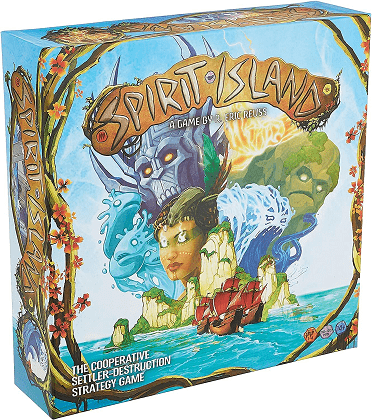
1 to 4 players
(An expansion is also available, in which case you can play with six people!)
Spirit Island has similar mechanics to Pandemic but a brilliant theme. In this game, you work together as natural forces to drive colonizers away. Each round is different because the setup is variable.
It’s fascinating to take the traditional ‘expand and build’ board game concept and flip it on its head. In this title, you’re technically doing the opposite. I like that.
One of the more revolutionary parts of the gameplay is how different spirits interact with each other. Carefully planned teamwork means you’re much more likely to win! There’s no better definition of ticking the ‘cooperative’ box!
Codenames Duet
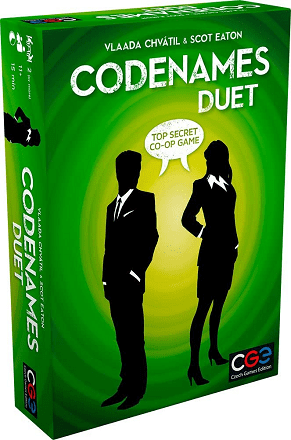
2+ players
Surely everyone has heard of the classic Codenames board game? It’s pretty simple once you get used to it, although I always struggle to come up with clues.
Codenames Duet is based on the regular version, but it’s tailored to two people and designed for cooperative play. You could play it with any number of people in reality. Simply split the players across each side of the table. It doesn’t even need to be even.
In terms of simplicity, Codenames Duet is the easiest option on my list – we win more often than we lose. But it’s by no means straightforward and, as always, requires some outside-of-the-box thinking and a good understanding of the other person’s mindset.
This is also the quietest option on the list, as you technically aren’t allowed to talk to each other (aside from a few exceptions). So, if you want a quiet evening with your other half, it’s well worth considering.
The Mind
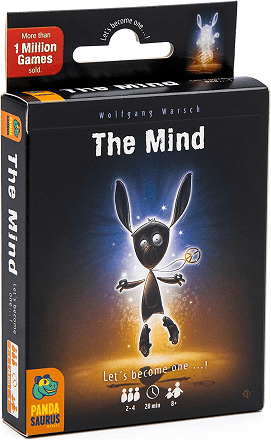
2 to 4 players
The Mind takes a very simple numerical concept and makes it into the type of co-op game to make your head explode. It’s Poker, but as if you’re all working together to win the collective prize (which is nothing). It actually bears a striking resemblance to Euchre, something I hadn’t clocked before.
In The Mind, you aim to discard your cards in ascending order. The catch? You aren’t allowed to talk or communicate with each other in any way.
If you make a mistake, you lose a life, and each player is dealt one more card with every progressing level. By the time you get to Level 6 or 7, things start to get really challenging.
This is an excellent option for a quiet evening in, a bit like Codenames Duet. In contrast to that game, though, The Mind is more about psychology than intense brainwork. I thoroughly recommend it!
Burgle Bros and Burgle Bros 2

1 to 4 players
Planning heists and getting rich by illegal means. Maybe Burgle Bros doesn’t take the moral high ground, but it’s exciting to be in a thematic cooperative board game that isn’t based on survival or a haunted house!
The setup for this game means it varies significantly each time you play. To be successful, it’s important to move at the right time, avoiding the guards (who also move every turn).
As a plotline, I really like this one. It’s just something different; it’s a bit outside of the norm and thus deserves a lot of praise!
Sherlock Holmes: Consulting Detective
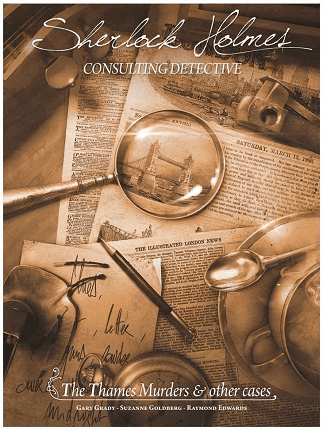
1 to 8 players
Most board game enthusiasts have a soft spot for Sherlock Holmes: Consulting Detective. And I absolutely know why.
There is nothing quite like it in the sense of dropping you into a sleuth-like, mystery-solving environment. Victorian London is there for exploring, the cases just waiting to be unraveled. Thematically, it’s brilliant, with the old directories and newspapers creating a really immersive experience.
You can play this game by yourself if you choose, but I think it’s much more fun with others in a collaborative format.
The only thing that bugs me a little about this game is the competitive aspect. You and the other players are trying to solve the case ‘faster’ than Sherlock. If you enjoy limits like this, that’s great, but I find it a little frustrating. You cannot replay it if you get your rushed guess wrong because you know the answers!
Exit: The Game series
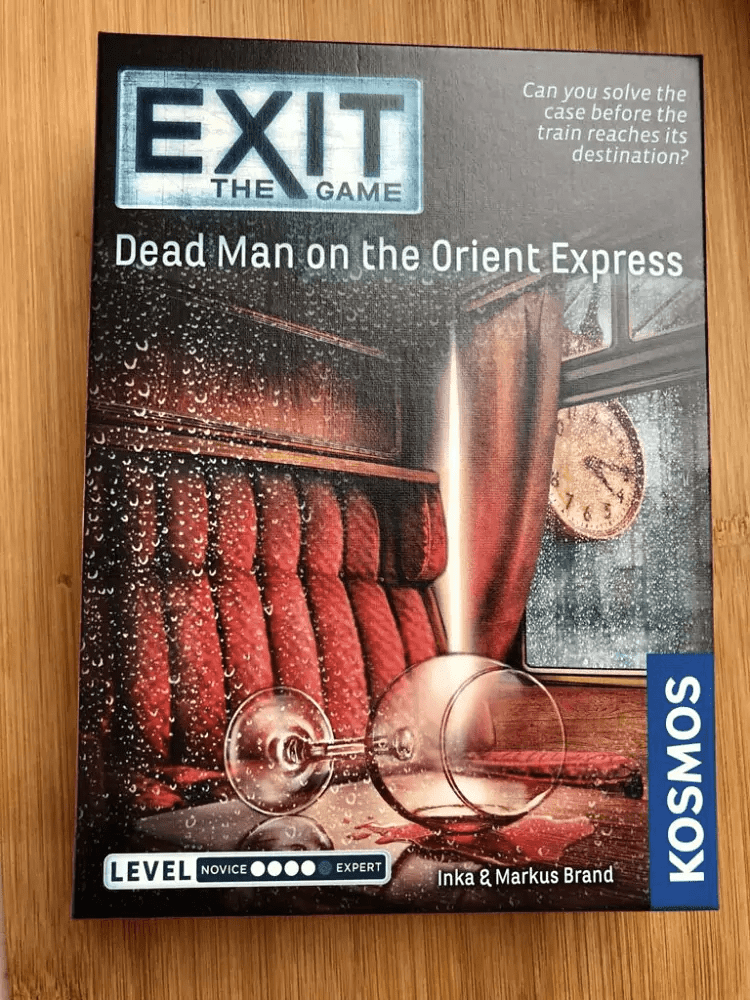
1 to 6 players (best with 2 to 3)
I’ve written about Exit: The Game a few times on Dice N Board because, well, they’re brilliant!. In the context of cooperative board games, there aren’t many better options!
There are 25 Exit games currently released, and more are sure to follow soon. Some are a little more frustrating, but the vast majority will have you riveted to the table.
In Exit games, everyone works together. We’ve found that someone always notices something you didn’t, bringing a natural teamwork aspect to your game night.
Of course, you can’t replay Exit games – once you’ve finished, that’s it. In most cases, you have to throw it away, which feels like a waste. However, you should have had an awful lot of fun playing it. The average game takes around 90 minutes, so you could try a couple if your group feels up to it!
Go with Exit: The Abandoned Cabin if it’s your first time playing!
Forbidden Series
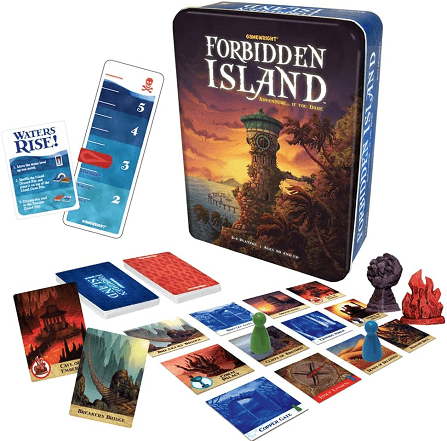
2 to 4 players; 2 to 5 players in Desert
As I mentioned earlier in this article, Forbidden Desert was the first co-op board game I ever encountered. It was intense to dive into, but my friend who brought it coached us all along. We still died, but hey ho, what can you do?
The Forbidden games hold a special place in my mind for this reason, but I like the survival aspects and how the pace increases as you progress. Each round is always different from the previous iteration, something I’m particularly fond of in a co-op board game.
The most engaging thing about the Forbidden series is how it stimulates conversation. You’ll chat with your friends about who should take what risk and what your collective plan should be. In some ways, I genuinely think it helps develop life skills.
If you enjoy board games, you’ll love the Forbidden series. In my opinion, Desert is the best, so go with that one. Forbidden Island is a more gentle way to ease yourself in.
Atlantis Rising (2nd Edition)
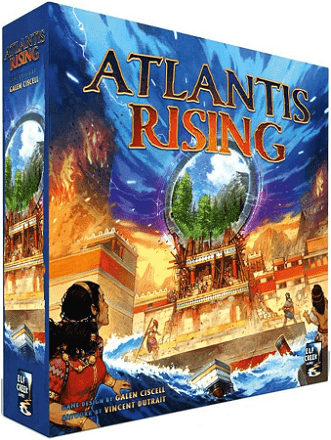
1 to 6 players
Atlantis Rising is a phase-based resource collection game. You need to work as a team to gather the materials you’ll need while the island quickly begins to flood. You’re aiming to build a cosmic gateway to save the Atlantians from extinction! It’s definitely an engaging theme!
Like all games, it’s risk vs. reward – but getting it wrong just once means things get much more demanding. And you will get it wrong. That’s part of it. The real trick comes from reacting effectively to unfortunate turns of events.
You might compare Atlantis Rising to a cooperative, more complex version of Settlers of Catan. It has the same underlying principles, but in this game, you’re on higher alert and fighting misfortune and the wrath of the gods.
There are a couple of things I recommend watching out for. For instance, I’ve found it hard to keep track of which meeples have been activated. There are ways around this (like lying them down), but it can be tricky to remember.
Also, this applies to all co-op games you can play alone; there’s a high risk that you don’t actually use teamwork. Instead, one person explains what you should do, and everyone else follows.
If you’re sure this won’t happen and you can all discuss and contribute to your next moves, don’t worry about this point!
Gloomhaven
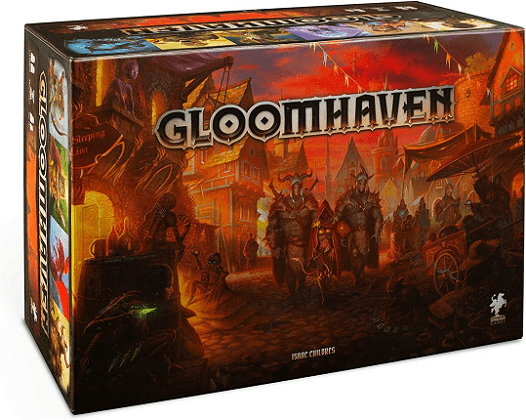
1 to 4 players
Hahaaa. Well, let’s include this one for the brave but adventurous among you!
Gloomhaven combines collective and personal goals and quests as you aim to make your way to the end. The intricacies are impressive, including how the plotlines interweave and the detailed scenarios. And, of course, there are the character figurines.
Unlike other RPGs, such as Dungeons and Dragons, nobody needs to act as the game master. Everything that happens in the rounds is either described in the scenario or automated. You also don’t need any dice!
Who is Gloomhaven not for? Anyone who doesn’t want to spend multiple days on a board game. You’ll need to play this one over several sessions to have a go as a team. The alternative is approaching it yourself (in which case you’ll choose two characters).
Dungeons and Dragons
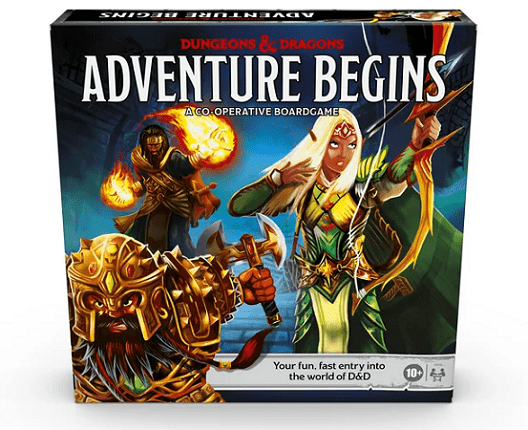
Preferably 3 to 4 players + a dungeon master
How could any co-op board game be complete without DnD? Now, these aren’t necessarily cooperative – but in general, you’re all aiming for the same goal. You’ll work through the scenarios created by the dungeon master to escape or reach the end, whatever that may be.
Despite my note above, playing with more than six players is about as hectic as it gets!
RPGs like Dungeons and Dragons are as expansive as it gets. You can do almost anything, and it’s all somewhat dependent on the DM (dungeon master). For that reason, it’s best to have someone who knows the game well take on this role.
A game could take almost any amount of time – I’d say anything from 90 minutes to seven or eight hours! Most last for around four hours, so it’s not an insignificant timeframe. Bear in mind, though, that the DM will have spent much longer preparing the scenario in advance!
Tips Just for You
I’ve compiled a few tips for you, both when you’re looking for a game and as a co-op board game player.
Here are a few of my thoughts.
Tips for Co-op Board Game Players
I recommend the following tips for all co-op board game players!
- Before you start, consider how long the game might take. Some fellow players might not be up for a day-long Dungeons and Dragons marathon!
- As I’m quickly learning, cooperative board games require a completely different mindset from standard PvP tabletops. You have to share resources, knowledge, little things you notice or remember from earlier, and so on. It can be challenging to switch to this mindset, so don’t forget! You’re all on the same team!
- Be patient and be kind. Another player might make a bad mistake. In fact, you probably will at some point, too. Things will come back to bite all of you, but if the teamwork aspect breaks down, you’re all done for.
- If you aren’t enjoying it, you don’t have to finish it! The whole point of co-op board games is to develop and nurture relationships with your friends and families. They aren’t doing their jobs if they’re causing boredom or strife!
Tips for Co-op Board Game Buyers
If you’re yet to buy a co-op board game, whether it’s for you, for your gaming group, or as a gift for someone else, here are a few of my tips.
- I would say that the two most important factors when buying a game are replayability (that is, variability) and an engaging theme.
- In a truly cooperative game, you won’t have one player calling all the shots. That’s just dull for everyone else. If you think this will happen, look for something to play where this can’t happen. Ironically, the simpler options are probably the best way forward here!
- Buy a game to match the person or people it’s for (including yourself). In particular, consider how intricate and detailed they are, along with the themes.
- Some board games (including the Exit games and Sherlock Holmes: Consulting Detective, above) can only be played once. Avoid them if you want a more long-term solution.
- Don’t be afraid to buy used copies! You often save a significant amount! Of course, that won’t apply to games you can only play once.
Frequently Asked Questions
Question: What is a co-op Board Game?
Answer: A co-op board game is one where you and your fellow players work against the game and its mechanics. You all win – collectively – or you all lose. They’re about teamwork and information exchange and help you get to know each other.
Question: Why Should I Buy a Cooperative Board Game?
Answer: Buy a co-op board game if you want to work on your teamwork skills and build relationships with your family and friends. As a unit, you must work together, which helps avoid fallings out and temper tantrums.
With that said, some will get frustrated when other players make the wrong move or ‘abandon’ them in the game. Thus, having someone with a calming presence at the table is still a good way to go.
Question: Are co-op Board Games Better than Regular Versions?
Answer: Well, whatever floats your goat! Co-op board games are fascinating and, in my opinion, are actually more engaging than most others. That’s because there are more things to consider and more resources at your disposal. At the same time, the challenge is often more significant.
You’re welcome to disagree!
Conclusion
Well, that’s all for now, folks! There are many ideas surrounding the best co-op board games out there, and I’ve listed only a few. You’ll find plenty of others available in your local store or by searching through Amazon.
Whatever cooperative game you end up playing, I hope this article has pointed you in the rough direction or at least stemmed some ideas.
Happy big game hunting!
Recommended reads:
- Arkham Horror Guide
- Best Movie Inspired Board Games- From the Big Screen to Game Night
- Best Ticket to Ride Strategies
- A Complete Overview of Ticket to Ride New York
- Terraforming Mars Guide: Fighting for Spaces in Space - April 22, 2023
- Zathura Board Game Guide - April 20, 2023
- Ark Nova Guide – Zoo Complex, Or Complex Zoo? - April 8, 2023

